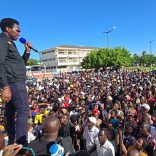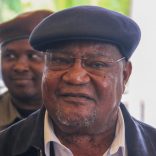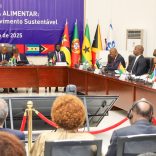Mozambique: Frelimo political commission calls on government for reforms, rationalization of ...
Mozambique: Former executive secretary calls on CPLP to help combat Islamist rebels

File photo: Lusa
A former executive secretary of the Community of Portuguese-Language Countries (CPLP), Isaac Murade Murargy, has called on the organisation to help Mozambique in the fight against the attacks by Islamist rebels in Cabo Delgado province, in the north of the country, with military aid or by helping mobilise international support.
The CPLP’s other member states are Angola, Brazil, Cabo Verde, Guinea-Bissau, Equatorial Guinea, Portugal, Sao Tome and Principe and East Timor.
Murade Murargy, a Mozambican career diplomat and former senior aide to Joaquim Chissano when he was president of the country, said in an interview with Lusa, that Mozambique needs international support to combat the raids in Cabo Delgado and that the CPLP should go from words to deeds in aiding a member state facing what he said is “external aggression” and “an invasion of its territory” by groups funded by outside organisations.
“My country, besides this great health crisis [the Covid-19 pandemic] is still facing two battle fronts,” he told Lusa. “The first is already old … which is the war against Renamo’s Military Junta [a dissident group in the main opposition party, made up of members of its armed wing], which is still operating in central Mozambique. Then there is the front in Cabo Delgado, which is more related to organised cross-border crime.”
In an organisation like the CPLP, which he described as “supportive, fraternal, in a spirit of mutual help”, it would be natural for “the heads of state … to hold an emergency meeting … to see what can be done to help Mozambique overcome this invasion of its territory”, said Murargy, who was the CPLP’s executive secretary between 2012 and 2016.
In Murargy’s opinion, the support could be technical and military, either material or financial, and the CPLP could also “be the sponsor to request the mobilisation of international support for Mozambique.”
According to Murargy, the CPLP’s current president, Cabo Verde’s head of state, Jorge Carlos Fonseca, “could go to Mozambique, talk to the Mozambican government, assess the situation … learn about the origin of this conflict, then inform the other member states or convene an urgent summit [to] find solutions.”
At the bilateral level, between CPLP member states, there must also be “military cooperation agreements that can allow the mobilisation of support to confront this aggression,” he said, adding that the CPLP must see what it can do “either at the level of its member states or of support outside the community, at the level of the United Nations, for example.”
When asked if the Mozambican government really wants help to tackle the problem of the attacks in Cabo Delgado, whose origin is not yet known for sure, the ambassador replied: “I don’t know. But the initiative must come from the CPLP. Mozambique is not going to ask the CPLP to meet.”
Murargy cited as an example the support that France is giving, in the form of military participation in a joint force, in fighting Boko Haram, a jihadist group that operates in the Sahel region.
“So if the United Nations takes the view that this conflict in Mozambique is cross-border and that it undermines stability from outside, if it is called as a peacekeeping force it will have to consider,” he concluded, saying that Mozambique’s president, Filipe Nyusi, may be “open to discussing that possibility and how that support could come”.
According to Murargy, the attacks in Mozambique are now being mirrored in Tanzania.
“It’s a move that’s coming from up there, but it’s coming down from Somalia,” he said. “It’s because there are citizens from other countries who are involved in this and who want to turn this whole region into an Islamic region.”
The attacks by armed groups that have been terrorising Cabo Delgado since 2017 have already resulted in the deaths of at least 1,000 people – civilians, members of Mozambique’s military and rebels – and set in motion a humanitarian crisis that has affected more than 700,000 people.
The UN estimates that 250,000 people have fled the worst districts – more than 10% of the province’s 2.3 million population.
For a year now, responsibility for some of the attacks has been claimed by the Islamic State. Rebel groups occupied key villages in Cabo Delgado some 100 kilometres from the provincial capital, Pemba, on the coast, for several days before being forced out under fire from the Mozambican Defence and Security Forces.













Leave a Reply
Be the First to Comment!
You must be logged in to post a comment.
You must be logged in to post a comment.